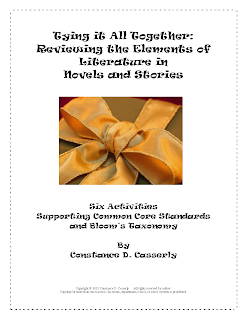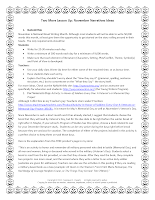The Huffington Post article, “These 11 Leaders Are Running Education But Have Never
Taught,” http://www.huffingtonpost.com/2013/11/08/education-leaders-never-teachers_n_4235177.html,
has grabbed hold of my brain and won’t let go. For two weeks, the material in this piece has
made a home in my subconscious jabbing it a few times a day for kicks and
giggles, and invading my dreams during the night just to be perverse.
Although, like Elvis, I have left the school building, any insight or
activity that benefits teachers teaching and students learning will always fuel
my passion. The downside of the coin-and
everything positive has a flip side, are people who become involved in the
world of education for political or monetary gain, or who are on power trips. Any
policy that keeps young people from becoming lifelong learners or that doesn’t
support the teaching profession just fuels my ire. The problem with this article is- it does
both.
I have an issue with people who have never, ever spent a day trying to
motivate, inspire, cajole, manage and discipline a room full of children to
jump off the curb and join their teachers on the Learning Path pushing their
policies on those who have walked the walk and talked the talk.
About a week into my first teaching job after college, I realized that
my professors did an A+ job preparing me in my subject area and in how to plan
and create lesson plans, but a C- job in showing me the realities of the
classroom. Why? They had probably never taught
below the college level and were theory-smart but reality-lacking.
The eleven headliners mentioned in this article experience the same Ivy
Tower vs. Classroom Reality complexity. Most
of them hold post-high school degrees, although not in any areas touching on
education. All of them are politically savvy, and some of them reside in the
financial stratosphere. Like the majority of people in this country, they care
about the education of our children-our future. That’s laudable. Education
needs all of the support and all of the sincere concern that it can get. Any concepts,
perceptions and perspectives that will support teachers, teaching and learning
should be considered if children are to succeed academically.
But…but… these directives should not be adopted and pushed on school
districts just because their originators and compatriots are a part of the Who I Know Club instead of the What I Know League.
My parents raised me with the understanding that What I Know would prevail. Even when a comment by the president and CEO
of a coal company, the father of one of my best friends, stomach-punched me with
the comment, “Oh, Connie, this is a Who
you Know world. What you know is
secondary-at best,” I refused to bury my belief. Call me naïve, but I have always
let knowledge be my guide.
During my career in education, I never strayed from teaching the
components of secondary English: literature comprehension, all types of writing,
grammar, vocabulary and oral speaking. Did I try to teach history because I
have spent years talking with my M.A. in History husband about historical
issues? No. Did I try to teach any area
of math? Now that would have been an audacious joke since Math and I have never
understood each other.
My writing successes have stemmed from What I Know as well as the hours, days and years that I have spent
transposing my thoughts to paper. Well,
this is slightly untrue. A Virginia
politician and a former student’s media-connected sister and her friend have
aimed a spotlight at my book, The House
of Comprehension, but only after they expressed their beliefs that it had
merit. Now, though, I need to develop an
understanding of marketing techniques, if I want that light to shine. Once
again, the What I Know, or in this
case, what I don’t know but have to learn, comes into play.
Why, then, can people whose college majors, and whose professional
lives, though brilliant in many capacities, but who haven’t sat in a classroom
since high school be allowed to impact teachers and students so strongly? Why
should those who, if at all, have only experienced teaching realities through
the work of parents or spouses hold such sway over the careers of those on both
sides of the desk? Does their concern about education give them the power to
dictate what teachers should teach, as well as how and when they should communicate
the material? Shouldn’t the thoughts and opinions of those who have been
successful in the classroom trenches year after year after year have more value?
If an interest is all that it takes to be influential, than I should be
a surgeon because I love learning about the body, what ails it and what fixes
it, and as a child, I spent many a happy hour studying the body and all of the
overlays (skeletal, muscular, etc.) in my parents’ encyclopedias. Or, I could
be a Supreme Court Judge because I have strong opinions about many subjects
that are based in constitutional laws.
Why shouldn’t I start at the top instead of grabbing onto the lowliest
rung of the Influencing the Lives of Millions
of People ladder as these eleven have done with educational matters?
Why not? Because I would be undermining
the grueling hours of learning to earn the degrees necessary to become a
doctor, a judge, a teacher, or anyone whose career depends on the knowledge and
understanding of specific material. Mere interest and opinions that could be
detrimental instead of beneficial to others should not wield more power.
Why not? Because I believe that book knowledge + on the job experience are
crucial criteria if one’s policies are to affect millions of people.
Why not? Because I will always
stand on the principle that What People
Know should always trump Who People
Know in decision-making situations.
Is this naïve of me? Yes.
Would I rather the doctor I trust to diagnose my symptoms or the judge
passing laws that affect my life have the knowledge, understanding and
experience to walk the walk and talk the talk? Yes.
Do I believe that these views that I hold are the realities that we
live?
No. And that bothers me.
Until next week,












